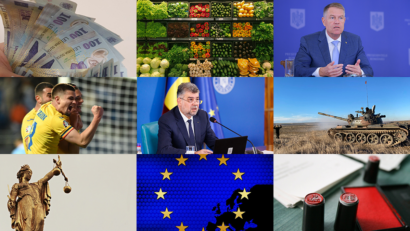The Week in Review 10-16 June, 2013
A review of the most important events of the past week.

Florentin Căpitănescu, 15.06.2013, 11:31
Romanian-German bilateral relations, in the spotlight
Early this week the Prime Minister of Romania Victor Ponta paid an official visit to Germany. The visit marked perhaps the most important visit on the agenda of the Romanian official since he took office. Talks with German Chancellor Angela Merkel focused on economic cooperation, given that for many years now Germany has been Romania’s top trade partner. Moreover, Prime Minister Ponta has expressed Bucharest authorities’ willingness to strike a strategic partnership with Berlin, just as Bucharest concluded with Paris. In turn, Chancellor Merkel outlined what she described the criteria that Bucharest authorities must comply with in order to make the economy more appealing to German investors. The upholding of the rule of law, legal security and the efficient fight against corruption are but a few landmarks German investors look for when placing their investments, Chancellor Merkel has argued.
Schengen accession, a foreign policy priority
Romania expects a favourable decision by the end of the year regarding its bid to join the free-movement area, Romanian Foreign Minister Titus Corlatean has recently said, upon retuning from a visit to France. Minister Corlatean told Radio France International that he had talks with his French counterpart Laurent Fabius on Romania’s efforts to bring its border crossings in line with state-of-the-art EU standards. Bucharest’s political dialogue with the EU Member States which have voiced concern over Romania’s Schengen ambitions is moving forward, Minister Corlatean has said. Originally slated for March 2011, Romania’s accession to the passport-free travel area has been repeatedly postponed because of the vocal opposition shown by some Member States such as the Netherlands, which have pointed to the unconvincing reform of the judiciary and the lack of progress in fighting corruption. Bucharest, on the other hand, claims it has fully complied with all technical accession criteria, something which the European Commission has acknowledged on a number of occasions.
Public debates on the Romanian Constitution and the referendum
The ruling Social Liberal Union in Romania is pressing on in its effort to revise the Romanian Constitution. The draft law has so far sparked heated debates in the public sphere. The parliamentary committee in charge of amending the country’s fundamental law has already endorsed a long series of amendments, which target a couple of sensitive issues. These include curbing the mandate and remit of the head of state, harsh penalties for the so-called political party switching, lowering the minimum voter turnout required to validate a referendum, sanctioning the public use of insignia of ethnic minorities and the recognition of the role the Royal House and the Orthodox Church have played in building the modern Romanian state. Also this week, President Traian Basescu has launched technical proceedings to hold a referendum on introducing a single-chamber Parliament, with the number of MPs limited to 300. The president submitted the same two matters to a referendum in 2009, when Romanians voted by a landslide majority in favor of the president’s proposals. Although in theory all political parties hailed its outcome at the time, the 2009 referendum did little to reshape the structure of the Romanian Parliament.
Romania’s interest in the Danube region remains high
Romania and neighboring Bulgaria have brought into commission a new bridge over the Danube River, linking the Romanian town of Calafat to Vidin in Bulgaria. The bridge is the largest construction of its kind over the Danube as yet. Attending the opening event were, among others, the EU Commissioner for Regional Development Johannes Hahn and the Romanian Prime Minister Victor Ponta. The second bridge connecting the two EU Member States is a segment of the trans-European corridor linking Dresden in Germany to Istanbul in Turkey. In another development, Romanian President Traian Basescu and his Bulgarian counterpart Rosen Plevneliev discussed the prospect of building a third such bridge. The meeting was held on the sidelines of the 18th Summit of the Central European Heads of State, held in Bratislava, Slovakia. On this occasion President Basescu reiterated Romania’s interest in the Danube Strategy under the 2014-2020 EU budgetary framework. The Nabucco gas pipeline was also high on the agenda of the meeting.
Romania hit by floods and heavy rain
The heavy rain that has hit hard Romanian territory in the past week have killed at least three people. According to the latest report drawn up by the Ministry of the Interior, dozens of towns and villages in Romania have been severely affected by heavy rainfall. The Government has decided to provide financial aid to some 200 families left stranded.




























